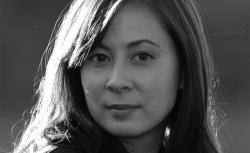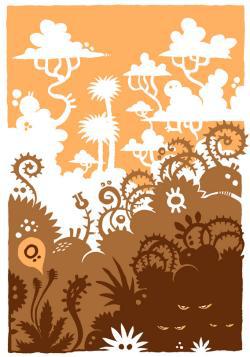Most poets start out in a kind of Eden, one that typically coincides with adolescence. Convinced of the great importance of everything, their own thoughts most of all, they name the world and find it beautiful. But poets eventually grow up, and these days they tend to learn a few lessons along the way—that the most important thing about many of us is the harm our way of living does; that not only is our self-importance suspect, but so is the idea that we have a stable self; and that beauty may be truth but truth is relative. Many of the best poets find ways of turning lessons like these into new sources of energy, creating new Edens teeming with predators and weeds.
Paisley Rekdal, the author of three previous books of poems as well as a smart and entertaining memoir-in-essays, The Night My Mother Met Bruce Lee, has stocked her latest collection, Animal Eye, with plenty of bad news—ecological corruption, a death from cancer caused by pesticides, a relationship suffocated by race. And yet this is a book built on pleasure, a convincingly, if subtly, joyous engagement with a world where “there is so little distinction … / between beauty, violence, utility.”
Take this excerpt from her poem “Ballard Locks,” where she writes of salmon passing through man-made protective tanks as they head upstream to spawn. They are, she says:
more like sequined
purses than fish, champagned explosions
beneath which the ever-moving
smolt fume smacks against glass, churns them up
to lake from sea level, the way
outside, fishing boats are dropped or raised
in pressured chambers, hoses spraying
the salt-slicked undersides a cleaner clean.
Now the vessels
can return to dock. Now the fish,
in their similar chambers, rise and fall
along the weirs …
by Paisley Rekdal
University of Pittsburgh Press
It’s a poem in part about the fact that we so often understand nature at one remove—through glass, through associations with other man-made things (purses, champagne bottles, boats). Later on, it’s also a poem about our desire to get closer and the degree to which that appetite is fueled by violence—we want to get closer to nature so we can kill and consume.
But poetry is its own remove, and Rekdal’s description is full of barely contained excitement, the adjectives reaching over line-breaks for their nouns twice in the first three lines, runs of heavily stressed syllables rattling against each other, as in “smolt fume smacks against glass,” with its intricate networks of matching and opposing consonants and vowels. (Say it out loud, paying attention to the ways your lips, tongue, and vocal cords move.) And then the relief that starts to set in after “the way,” including a few runs of iambic regularity (“the vessels/ can return to dock,” “rise and fall along the weirs”), an orderliness that’s much more vibrant than the sanitizing order it describes.
Like pretty much all collections, Animal Eye doesn’t always live up to its best moments. (Not coincidentally, most poetry books also feel too long.) The weaker poems here aren’t bad, and they often include good stories, including Rekdal’s painfully funny account of (accidentally) inciting a lemur escape in the Lisbon zoo. But in telling these stories, Rekdal loses some of the richness that defines the lines above. It feels like the obligation to get to each detail in the proper order distracts her, and instead of the poetic rhythms enriching the prose, they seem, at times, to run in uneasy parallel.
In a lesser book, these same poems still might be standouts, but they lack the physicality of Rekdal’s best writing (which, for readers of Elizabeth Bishop, may also spur a thrill of recognition). You can hear it again in this passage from “Arctic Scale,” a breathtaking stanza that appears immediately after the disquieting lines “oil rigs dip their certain needles/ and the Inuit women’s breast milk has been declared/ hazardous waste”:
It is so beautiful here. Here is a wall-sized field of green
with patches of corn silk. Here is a miraculous range
seamed with what I have to be told is coal,
the enormous, glassy sea chattering its blue
to the sky, the glacier clasped between them
quietly disappearing.

Photograph by Tommy Chandler.
One of my favorite poems in the book is titled, simply, “Happiness.” It’s a risky poem in a way, one that chooses joy when others are suffering, and if it were any less well-written—any less full of joy to be had by anyone who finds it, any less adept in enacting the appetite that underpins our joy—I suspect it would feel cheap or even grotesque. At the poem’s end, Rekdal writes of unhappy neighbors, and of her garden, which “lives alongside their misery./ It glows each evening with a violent light.”*
Writing gives us a way of living beyond our means. “The magpie comes and all I can think is/ beauty, beauty,” Rekdal exclaims in “Closer,” “though you said/ it’s a junk bird, though its commonness/ makes most ignore it.” In acknowledging the disappointing facts of our existence and singing her way into its amazement, she has created poetry that lives alongside the misery we sometimes witness—and sometimes cause.
See all the pieces in the new Slate Book Review.
Correction, April 1, 2012: This review misquoted a line from Paisley Rekdal’s poem “Happiness,” ommitting the phrase “each evening.” (Return to the corrected sentence.)
